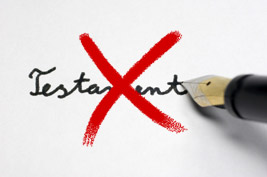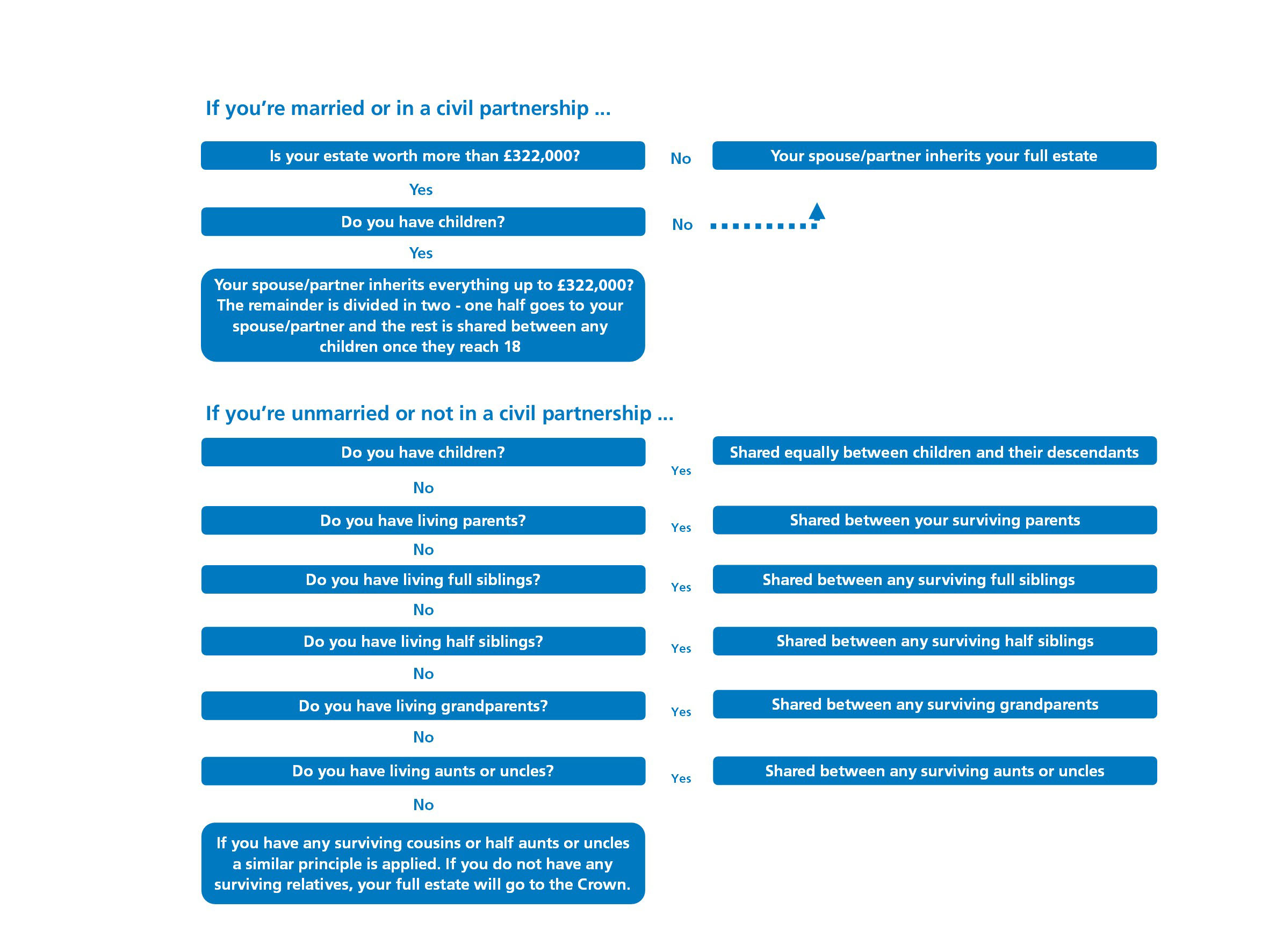What to do when someone dies
There are also a lot of Chinese whispers about it, so we hope that this page clears some of that up.
This is intended as a very basic guide, and there is an awful lot more to this subject.
So please contact us for specific advice, if you need it.
There are essentially two stages to dealing with a deceased’s estate
– Firstly obtaining the Grant of Representation and secondly Administering the Estate:
Stage 1 – Obtaining the Grant of Representation:
There are two steps to this process. To try and avoid confusion lets call them A and B.
A - You will need to swear an oath
This is basically a form that will confirm that you are the correct person to deal with the deceased’s estate, and will confirm certain details about the deceased such as their name and date of birth.
B - You will have to complete a tax form or two
If the estate is worth less than £325,000, then most of the time you will have to complete a very basic tax form and won’t even have to submit it to the Inland Revenue (Now actually called Her Majesty’s Revenue & Customs, or HMRC). But sometimes, whether or not the estate is worth over £325,000, there are potentially several other forms you will need to complete and file formally with HMRC. HMRC can take several weeks or even months to approve these forms.
Once you have completed these two steps, you can apply for the Grant of Representation. It should then take around two weeks for the Grant of Representation to return from the Probate Registry, and that’s it. What you will get back is an official looking document that basically certifies that you are entitled to sign things in relation to the winding up of the deceased’s estate (e.g. getting money out of bank accounts, selling property owned by the deceased – that sort of thing)
Stage 2 – Administering the Estate:
This can be the hard part. Basically what you are looking to do now is to carry out the wishes of the deceased. If they left a Will then you should be trying to do what the Will says. If they didn’t leave a Will then there are rules (called the rules of intestacy) which set out who should receive what from the estate.
On a basic level you will need to gather in assets of the estate (so get money out of bank accounts, maybe sell shares, maybe sell property), pay off any debts of the estate, and distribute what’s left according to the Will or rules of intestacy. You will also have to send a copy of the Grant of Representation to certain organisations so they can amend their records to show that the person has died. You may well also have to file tax returns with HMRC.
This can take anything from a matter of days to many years. For example, if you just have to close one bank account and pass the proceeds to a surviving spouse of the deceased, then it should be quite quick. But if there are properties or businesses to sell, the process can take some time and will require care. If the Will is carelessly drafted then this can complicate things still further.
Disputing Estates or Wills:
– When things go wrong
Unfortunately, this is more and more a common topic. By an ‘Estate Dispute’, we mean an issue arising from the affairs of someone who has passed away. Sometimes long-running family disputes can come to a head at a time of bereavement – which in turn makes an already difficult situation even harder to cope with.
The types of dispute we have seen have taken a number of different forms:
The Will contains surprises
Somebody who has been left little, or nothing, under a Will but expected more. This happens often, and is sometimes no surprise. But we have been involved in many cases where the child of a family has felt close to their parent, only to find a Will was made days before the deceased died, and this Will excluded one of the children. Is it a simple typing error? Or does the Will say one thing but actually (legally) mean another? This can be resolved quite amicably, but needs care. Was the deceased pressured in some way, or perhaps wasn’t in their right mind when making their Will? In this case it might be something more sinister, or serious, and you might need some support.
Beneficiaries aren't happy with how the estate is being handled
Managing a deceased estate can sometimes be very complicated, and time consuming. Often all a family member needs is clarification as to what is happening. But sometimes something is happening incorrectly, or years have passed and there is no end in sight. What can you do about it?
Local Authority care home fees
Local Authority Care home fees are encased in an incredibly confusing system. If you or a relative are in a nursing or care home, you may be paying fees that should have been funded by the local authority or NHS. You might be able to claim the fees back. The NHS has set some deadlines for claims, notably:
– 30 September 2012 if you should have been assessed between 1 April 2004 – 31 March 2011, and
– 31 March 2013 if you should have been assessed between 1 April 2011 – 31 March 2012
These rules only apply to people in England.
Without a Will:
– What happens if you have no will?
If you die without a Will your belongings are distributed according to a set of rules laid down by Parliament. This information is correct at the time of writing (November 2020).
Click to find out what happens when you have no will.
What to do when someone dies
There are two main stages to dealing with a deceased’s estate
Firstly, obtaining the Grant of Representation and secondly administering the Estate:
Stage 1 – Obtaining the Grant of Representation:
- You will need to complete a statement or application form which will confirm that you are the correct person to deal with the deceased’s estate, and confirm certain details about the deceased such as their name and date of birth.
- Next you will have to complete a tax form or two. In certain circumstances you will only have to complete a very basic tax form. In other circumstances, there are potentially several other forms you will need to complete and file formally with HMRC. HMRC can take several weeks or even months to approve these forms.
- Then you can apply for the Grant of Representation which will normally take around 4 weeks to return to you. This document certifies that you are entitled to sign things in relation to settling the deceased’s estate (e.g. getting money out of bank accounts, selling property owned by the deceased)
Stage 2 – Administering the estate:
- You are now carrying out the wishes of the person who died. If they left a Will then you should follow what the Will says. If they didn’t leave a Will, then there is some guidance here.
- You will need to gather in assets of the estate (get money out of bank accounts, maybe sell shares, maybe sell property), pay off any debts of the estate, and distribute what’s left according to the Will or rules of intestacy. You will also have to send a copy of the Grant of Representation to certain organisations so they can amend their records to show that the person has died. You may well also have to file more tax returns with HMRC. This process can take anything from a matter of days to many years depending if there are properties or businesses to sell or if there is a dispute.
What if someone disputes the estate?
Unfortunately this is a more and more common situation and can make an already difficult situation even harder to cope with.
There are different types of disputes that may arise that we can help with
The Will contains surprises
Those who benefit in the Will may not happy with how the estate is being handled.
Managing a deceased estate can sometimes be very complicated, time consuming and can involve updating and many people.
Get in touch, we can help you with the Probate services you need
We offer a free consultation and you can make an appointment to speak to us by calling 01623 45 11 11, emailing probate@fidler.co.uk, making an appointment in person, at our offices, by video call or in the comfort of your own home.






